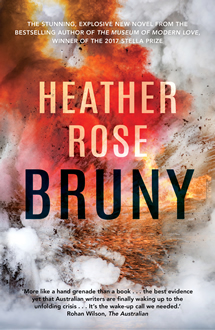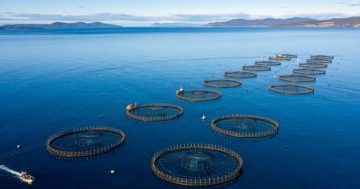Reviewed by Robert Goodman.
By Heather Rose, Allen and Unwin.
 For those wondering about the name of this book – Bruny is a large island, south of the Tasmanian capital Hobart, used mainly by holiday makers. When Heather Rose’s new novel opens, a new six-lane bridge under construction that is designed to connect Bruny to the mainland is partially brought down by explosives in what could be a terrorist attack. But no one in power is too keen to track the terrorists down, they are more interested in finishing this over-engineered piece of transport architecture before the next Tasmanian state election. Welcome to Heather Rose’s future, much like the present only a little hotter and including a massive bridge to bring tourists to a fairly unspoilt part of the world.
For those wondering about the name of this book – Bruny is a large island, south of the Tasmanian capital Hobart, used mainly by holiday makers. When Heather Rose’s new novel opens, a new six-lane bridge under construction that is designed to connect Bruny to the mainland is partially brought down by explosives in what could be a terrorist attack. But no one in power is too keen to track the terrorists down, they are more interested in finishing this over-engineered piece of transport architecture before the next Tasmanian state election. Welcome to Heather Rose’s future, much like the present only a little hotter and including a massive bridge to bring tourists to a fairly unspoilt part of the world.
Astrid “Ace” Coleman, UN mediator, is brought back to her home to try and negotiate between the bridge’s boosters and the various groups that have sprung up to oppose it. But it is more complicated than that, Astrid is twin sister of the Tasmanian Premier and half-sister of the leader of the Tasmanian opposition party. While this all could seem a little contrived (and it is), as Astrid herself observes, it is a situation that could only happen in Tasmania:
Elsewhere a political family like ours would be impossible, even ludicrous. But you get used to it in Tasmania. We’re a very small population on a very southern island and we’ve been marrying each other for two hundred years.
Astrid gets to work, interviewing bridge crew, supporters and protestors:
Tasmanians have a history of being extremely good at protests. When they band together, they have created protests on an international scale. They have stopped rivers being dammed for hydro schemes, and pulp mills being built.
But there is something more going on here. The project is being part funded by the Chinese Government and when additional workers are needed to finish the bridge to deadline, national laws are changed to allow a group of Chinese workers to be flown in. And Astrid herself is more than she seems, although as narrator she plays her cards close to her chest.
Astrid is a fairly kick-arse (at least in a verbal sense), take no prisoners, highly opinionated woman in her fifties, a character not often seen at the centre of this type of political thriller which tends to focus on boys and toys. Her experience, glimpsed early on, and global world view allows her to put this local conflict into a wider context. She shortcuts descriptions by considering the movie star who the person she is speaking with most resembles (handy for a screen adaptation perhaps). Her observations of the situation and the politics draw in examples from other parts of the world, including the life she has temporarily left behind in New York:
Everywhere I’ve travelled, regardless of skin colour, religion, economic or political circumstances, it’s men who have created the violence and viciousness of the world. It’s the way it is. Theyre’ve been a few exceptions of course. Maggie Thatcher…
Or this:
At times like this… I thought how there were eight billion people on the planet with very little idea how to communicate effectively. I was meant to feel okay about this because at the grocery store there was an excess of lettuce varieties, sheep’s yoghurt and coconut ice cream… I felt as if twenty first century existence had been assessed by a quantity surveyor who had determined we were all just parts, not people.
But she saves her most damning observations for Australian politics:
That’s why I hate Liberals. It’s all money and power. I hate Labor aswell, because they’ll sell out on anything – workers, refugees, artists, freedoms – just to get power.
Or this:
In the seventies Australia had been a nation of the fair go – an idea embraced from the prime minister down. One wins, we all win… But it was bled dry, that national heart.
All of this makes Bruny a little too polemical. Astrid (and Rose, presumably) absolutely wears her political convictions on her sleeve. While some books are ripped from the headlines, this one seems to be ripped from the opinion pages and those with very specific opinions about the potential future relationship between Australia and China. Rose balances this with family drama and intrigue but given the family concerned is neck deep in the politics, this is not always successful.
While there at first appear to be strictly drawn black and white lines, and some stay strictly on one side or the other, Rose brings out shades of grey in many of her characters. The solution comes, however, through old Tasmanian ties. It turns out that saving the world may just depend on who you covered for in high school.
Bruny is a political thriller of the type that American authors excel at but Australian authors rarely attempt. It demonstrates Rose’s deep love for Tasmania, its landscapes and its people, and has everything thriller readers would expect – deep state conspiracies, political manoeuvring, explosions (mainly off screen), double crosses, spycraft, and a smattering of romance. While the overt political commentary throws this balance off a little, Bruny is still a complex, topical and engaging tale.
This and over 450 more reviews can be found on Pile by the Bed.











